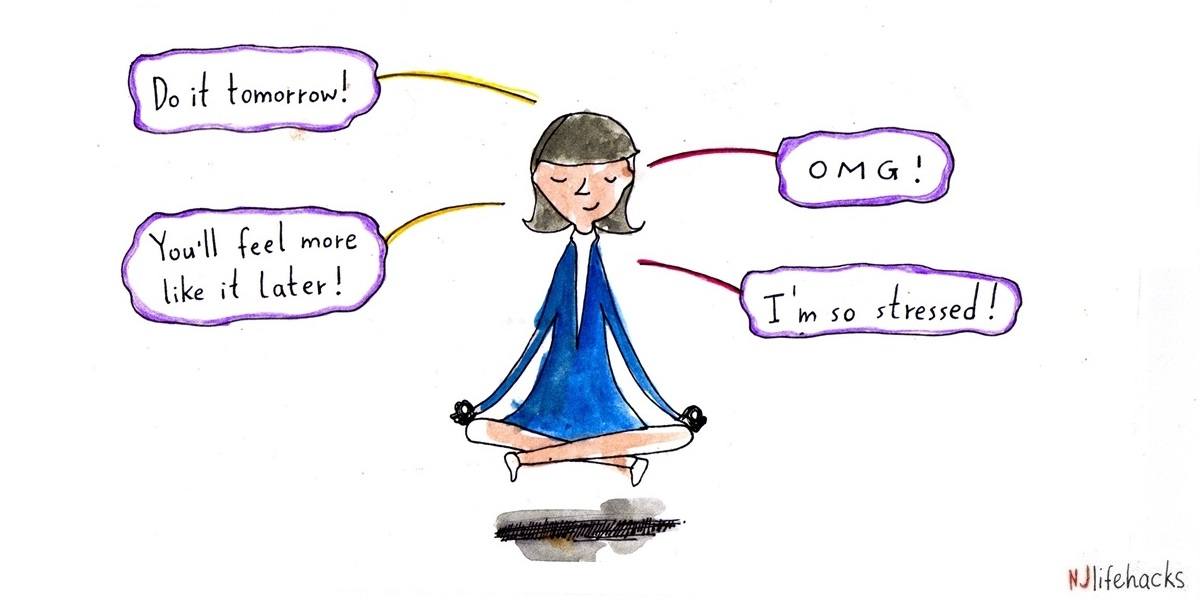Procrastination confronts us with productivity’s worst enemy: our uneasy relationship with long-term goals and our susceptibility to the promise of immediate rewards. Your brain’s reward system (brain areas that use neurochemicals associated with reward expectancy, such as dopamine, to attach positive value to stimuli) enjoys the novelty of a new Facebook post or funny meme. It has a harder time giving an emotional charge to completion of a difficult task that pays long-term dividends.
Confronting procrastination, then, is a matter of knowing your enemy. Why is it so hard to really feel, and not just nag yourself into feeling, the value of long-term payoffs over impulsive rewards?
Let’s put the problem in cognitive terms: procrastination is related to the failure of executive function. This is a term that refers to several related cognitive functions, including inhibiting impulses, sequencing complex tasks and updating behavior based on goal-relevant changes (i.e. switching gears when your boss gives you a new project. Our executive function, supported by the brain’s frontal cortex, provides us with the willpower to discount immediate rewards and tackle deadlines step-by-step. Sadly, the frontal cortex is younger than the limbic system. It’s the latter that has the lion’s share in our decision-making, as we obey the evolutionarily older impulses of seeking maximal reward for minimal work.
It’s not just the positive emotion associated with short-term reward that sabotages our productivity. The process of procrastination is an emotional roller-coaster between the peaks of charging one’s self up to do the difficult task and the despondency about succumbing to a time-sucking temptation. Most of us have ridden this ride before. Consequently, the experience of a difficult task carries its own dread as well as the dread of another cycle of committing, procrastinating, and nagging one’s self back to work.
Overcoming procrastination is about two things: improving our executive function and becoming aware of the emotional cycles that drive procrastinating behavior. Improving executive function helps us to short-circuit the short-term reward impulse, while developing a mindful attitude towards the emotions difficult tasks evoke in us, help us stay off the roller-coaster ride of excitement and despondency.
With that in mind, here are six tips for overcoming procrastination:
1. Decompose a difficult task into small, timed steps that specify the “if-then” of the task. These are “implementation intentions” that help you focus on small, attainable steps to your goal.
2. Work in chunks so you don’t exhaust your cognitive reserve. For example, the Pomodoro Method of productivity prescribes 25 minutes of work followed by 5 minutes of rewarding activity.
3. Pay attention to your self-talk before, during and after working. Be mindful of the emotions and bodily sensations that accompany this self-talk and try to change your internal narrative to be accepting of setbacks and distractions.
4. Don’t commit yourself to a rigid schedule. Keep a flexible schedule that allows time for rest as well as important tasks. Resist the urge to schedule everything in advance.
5. Don’t be tempted to multi-task. Multi-tasking causes stress and erodes attention control. Work mindfully on one task at a time.
For further targeted assessment cognitive rehabilitation and executive functions coaching contact our office at: 800-240-8153 or at info@neuro-psychologypractice.com.


Add Comment